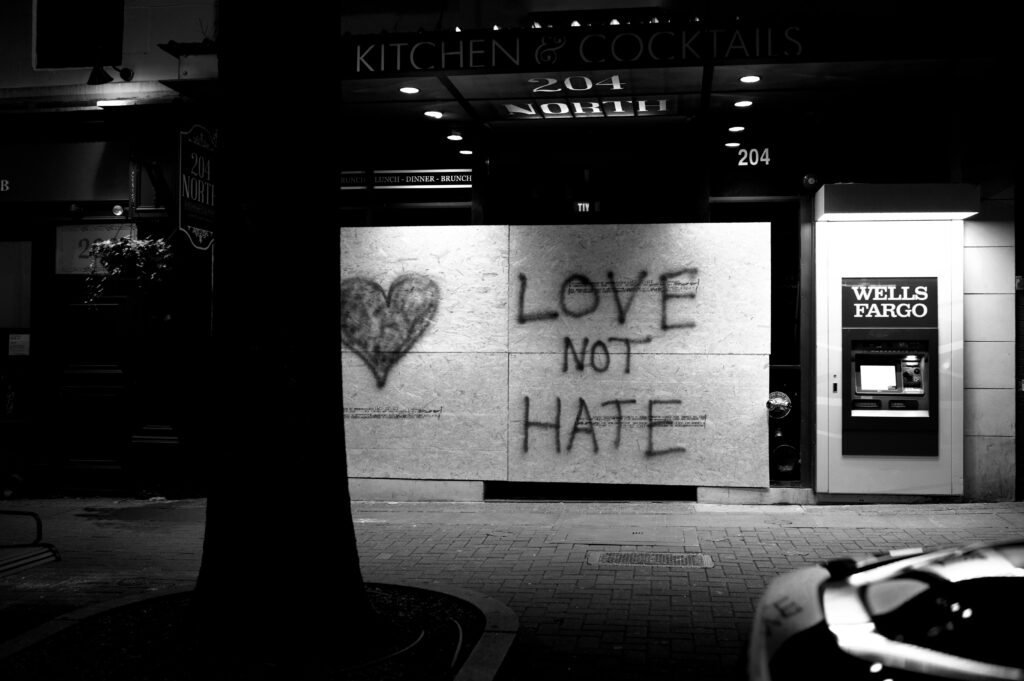
In this blog for the International Day for Countering Hate Speech, Federico Faloppa, Professor of Language and Discrimination, discusses why tackling the rising tide of hate speech requires a global effort involving governments, academics and civil society working together.
It may feel like a long time ago, as it happened during the Covid-19 pandemic – a challenging period we all wish to leave behind. Yet it was only four years ago, and the issue is still with us.
In July 2021, the UN General Assembly raised growing global concerns about “the exponential spread and proliferation of hate speech” worldwide and adopted a resolution on “promoting inter-religious and intercultural dialogue and tolerance in countering hate speech.” This resolution recognised the need to combat discrimination, xenophobia, and hate speech, and called on key players including countries, to step up their efforts to address this problem in line with international human rights law.
The UN also made 18 June the International Day for Countering Hate Speech, building on the UN Strategy and Plan of Action on Hate Speech launched exactly two years earlier, on 18 June 2019. On this day, governments, international organisations, civil society groups, and individuals are encouraged to run events and initiatives that promote strategies to identify, address and counter hate speech.
Whether as countries, elected bodies, the private sector, media and internet companies, faith leaders, educators, civil society groups, individuals affected by hate speech, or simply as citizens, we all have a moral duty – according to the UN resolution – to speak out firmly against hate speech and to play a role in countering this harmful phenomenon, whose effects can be devastating for people, communities and societies.
These effects are not new, but we’ve seen over the past decade that their scale and impact have grown with the rise of new communication technologies – particularly social media platforms, messaging apps and online forums that allow hateful content to spread instantly to millions of people worldwide. These tools have made it easier for extremist groups to organise, recruit followers and amplify their messages far beyond what was possible before.
If left unchecked, hate speech fuels discrimination, human rights violations, and conflict by undermining peace and social unity. This is why national and international organisations have long worked to counter hatred, promote the rule of law and design legal frameworks that balance freedom of expression with effective measures to prevent and combat incitement to hatred and discrimination.
However, as the Recommendation CM/Rec(2022)16 of the Committee of Ministers to member States on combating hate speech points out, hate speech encompasses a broad range of expressions that differ in severity, harm and impact. Because of this, a range of targeted measures must be adopted that extend beyond criminal law. These include counter-speech, intercultural dialogue and understanding, education, information-sharing and awareness-raising initiatives.
This highlights the crucial role of educators and civil society organisations, as well as the importance of building partnerships to address the complexity of hate speech at various levels and share best practices locally, nationally and internationally. That is the focus of “No Hate Speech Week 2025” (17–20 June), organised by the Anti-Discrimination Department of the Council of Europe in Strasbourg: a full week of meetings, workshops, and events designed to give participants – including public figures and representatives from national authorities, civil society organisations and industry – a platform to discuss recent legal and policy developments, share best practices and build stronger partnerships.

The University of Reading is also represented at “No Hate Speech Week 2025” and acknowledged as a key academic player advancing research and impact in this field. As a scholar with over 20 years of experience in language and discrimination – and as one of the appointed experts and tender consultants for the Council of Europe – I co-authored the Recommendation CM/Rec(2022)16, and I am currently working on projects in Armenia, Kosovo, Moldova, and Montenegro on behalf of the Council. Additionally, as co-founder of the Italian network to combat hate speech and hate phenomena (www.retecontrolodio.org), I will be leading a panel on building and strengthening international civil society coalitions, and will participate in meetings with government representatives focussed on improving how research makes a real-world difference.
Academic contributions are essential to studying, monitoring, and addressing hate speech at various levels – especially given its implications for education, the increasingly troubling role of misinformation in stirring up hatred and discrimination, and the growing use of artificial intelligence (AI) to both spread and counter hate speech online. The University of Reading, with its commitment to human rights, diversity and inclusion, and wellbeing, can – and must – be at the forefront of this transnational effort to tackle hate speech, hate crime, inequality and social conflict effectively.
Cover photo by Keith Helfrich on Unsplash.

